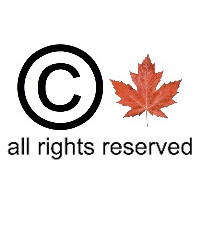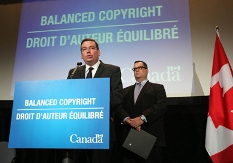The careful step-by-step implementation of Canada’s Copyright Modernization Act has left the door open to judicial interpretation of new rules and regulations, it has also allowed for a more complete examination of the law’s impact, both here in Canada and potentially around the world.
 Although the Act passed last year, full regulatory implementation requires additional government action and possible alignment with international copyright treaties; some aspects of the new law are now in place and enforceable – others not so much.
Although the Act passed last year, full regulatory implementation requires additional government action and possible alignment with international copyright treaties; some aspects of the new law are now in place and enforceable – others not so much.
Nevertheless, there are organizations and agencies here in Canada that are taking tangible steps and strong action in defence of alleged victims of copyright infringement.
They are acting with the guidance of one of the more controversial aspects of the amended Canadian Copyright Act, something called the “notice and notice rule”.
If a rights holder feels that, for example, someone has illegally downloaded their copyright protected movie, they can send a notice to an Internet Service Provider informing them of the alleged violation and requiring them to take action against a specific subscriber or consumer.
The ISP must forward the notice to that Internet user; what’s more, the ISPs must retain records for six months that allow the identity of subscribers to be established and later disclosed if necessary.
While that scenario has unfolded before, the formalization of the rule with regulatory power is seen as an extra onus on privacy considerations, if not cable and satellite bills (as providers seek reimbursement for their mandated activities).
A Montreal-based company called Canipre, for Canadian Intellectual Property Rights Enforcement, is a global leader in the identification of copyright infringement activities, and in the possible take-down of those involved in copyright infringement.
The firm boasts that in the last five years, it has “interdicted an estimated 40,000,000 files and issued more than 3,500,000 take-down notices with a compliance rate of 100%.”
The company reports an adept ability to manipulate the same kinds of file-sharing technologies and IT techniques that are often associated with online piracy, such as peer-to-peer file sharing networks.
The company says “Everyone leaves a trace” and that its staff are able to “get it done”.
Among the Canadian examples of online copyright infringement cases and the resulting “notice and notice” response, the copyright battle here over the movie The Hurt Locker.
In that instance, three Canadian Internet Service Providers – Bell Canada, Cogeco Cable and Videotron – were ordered to hand over details about their customers alleged violation of copyright by illegal downloading of the film.
At least two ISPs confirmed that they did comply, and that they helped link IP addresses with specific customer account information.

Canadian government ministers introduce the Copyright Modernization Act.
Independent ISP Teksavvy was also caught up in the case, and it reported that it was asked for the names of over 2,000 of its customers alleged to have downloaded the Voltage Pictures property from BitTorrent.
The Hurt Locker is a powerful, successful and award-winning film, directed by Kathryn Bigelow.
Industry figures indicate the movie was produced on a budget of $12 million U.S., a figure equaled in its just its opening weekend box office results.
And in an ironic twist, the filmmakers themselves were facing legal action, initiated by a soldier who claimed the story was his, and that the script was violating his copyright.
That case was dismissed.
Other cases still loom, however, and they are seen as undercutting the general public’s acceptance of the basic copyright principles and confidence in their service providers (if not government agencies).
The public may see the pursuit and legal prosecution of individuals as rather heavy handed – in one U.S. case, a woman was ordered to pay $2 million for downloading two movies.
The Canadian government has put a maximum of $5,000 in damages for individuals that are caught downloading or distributing copyrighted content; the provider site may be hit much harder, as much as $5,000 per download.
If ISPs are forced to reveal the identity of their subscribers who may be illegally file-share (which a court would eventually determine), those so inclined may turn to the use of stronger ‘anonymizing technologies’ to hide their identify or activity.
Conversely, those who duty is to deter prevent and track down copyright violators may also turn to stronger, deeper and more robust technologies.
Either way, there’s powerful implications for personal privacy and online security for all of us.
So, companies like Canipre have drawn both praise and condemnation.
And international protests have arisen over the introduction of criminal penalties for minor, non-commercial copyright infringements, and the fact that ISPs could disclose personal information to authorities without safeguards for privacy.
The so-called TPP negotiations have drawn such criticism from many quarters, including major political parties here and abroad.
In a statement to that effect, Canada’s Green Party says it believes “the TPPA is being used to sneak in measures to bind its member countries to extensive and harsh laws on Internet use that wouldn’t be acceptable at the domestic level – including harsher criminal penalties for minor, non-commercial copyright infringements, a ‘take-down and ask questions later’ approach to pages and content alleged to breach copyright, and the possibility of Internet providers having to disclose personal information to authorities without safeguards for privacy.”

Copyright Enforcement.ca’s word cloud on copyright issues
Others have suggested some sort of open, accessible and transparent universal licensing scheme as a way to both provide some guaranteed payment for copyright material obtained for non-criminal, non-commercial activities (personal viewing, making a protection copy of purchased material, accessing academic, research or educational material, and so on) but also to clearly separate consumer copyright issues from more threatening online criminal activities.
# # #
submitted by Lee Rickwood



